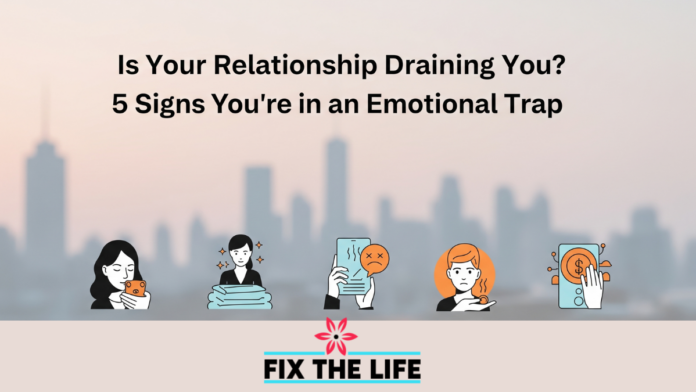Relationships should nurture, uplift, and provide emotional security. However, sometimes they evolve into toxic dynamics, leaving you drained and emotionally exhausted.
If you often feel mentally exhausted or unappreciated, you might be experiencing emotional burnout from unhealthy love. Here are five key signs that indicate you are trapped in a toxic relationship.
5 Signs You’re in an Emotional Trap
1. You Feel Emotionally Exhausted Instead of Fulfilled
A healthy relationship should bring joy, companionship, and emotional support. However, if you frequently feel exhausted after interactions with your partner, it’s a warning sign. Emotional burnout occurs when your energy is drained due to constant conflicts, emotional neglect, or unreciprocated efforts.
💡 Example: You constantly try to make your partner happy, but they rarely acknowledge your efforts or reciprocate affection. Over time, you feel depleted rather than appreciated.
🔹 Solution: Evaluate how much emotional investment you are making compared to what you are receiving. If it’s consistently one-sided, consider setting boundaries or reassessing the relationship.
2. You Walk on Eggshells to Avoid Conflict
In an unhealthy love dynamic, partners may avoid expressing their true thoughts for fear of arguments or negative reactions. If you find yourself constantly second-guessing your words or actions to prevent conflict, it’s a sign of emotional suppression.
💡 Example: You hesitate to share your concerns because your partner might react negatively or withdraw affection. This fear slowly diminishes your confidence and emotional well-being.
🔹 Solution: Open communication is essential in any relationship. If your partner dismisses your feelings, it may indicate deeper relationship toxicity that needs to be addressed.
3. Your Self-Worth Has Declined
A loving relationship should boost your self-esteem, not diminish it. If your partner criticizes you, invalidates your feelings, or makes you feel unworthy, you may be trapped in a toxic relationship.
💡 Example: Your partner frequently points out your flaws, dismisses your achievements, or makes sarcastic remarks that hurt your confidence.
🔹 Solution: Surround yourself with supportive people who recognize your value. If your partner consistently undermines your self-worth, reconsider whether staying in the relationship is beneficial.
4. You Give More Than You Receive
Compromise is vital in relationships, but it should be mutual. If you are the one constantly adjusting, sacrificing, or taking responsibility for fixing issues, it may indicate an imbalanced partnership.
💡 Example: You initiate conversations, apologize first, and plan outings—all while your partner puts in minimal effort.
🔹 Solution: A relationship should be a partnership, not a one-person job. Discuss the imbalance with your partner and determine whether they are willing to change.
5. You Feel Trapped and Unable to Leave
One of the biggest signs of a toxic relationship is feeling emotionally or psychologically trapped. Fear, guilt, financial dependency, or hope for change may keep you stuck in an unhealthy cycle.
💡 Example: Even though you recognize the relationship is toxic, you convince yourself to stay because you fear loneliness or believe things will improve.
🔹 Solution: Breaking free from a toxic relationship can be challenging, but regaining emotional well-being is essential. Seek support from trusted friends, family, or professionals to help guide you toward making healthier choices.
FAQ: Common Questions About Toxic Relationships
Q1: Can a toxic relationship be fixed?
Yes, but only if both partners acknowledge the issues and actively work toward improvement. Effective communication, therapy, and mutual respect are necessary for change.
Q2: How do I set boundaries in an unhealthy relationship?
Identify what behaviors drain you and communicate your limits clearly. If your partner dismisses your boundaries, it may indicate deeper toxicity.
Q3: How do I heal after leaving a toxic relationship?
Prioritize self-care, seek therapy if needed, and surround yourself with positive influences. Healing takes time, but focusing on personal growth can accelerate the process.
Q4: What are early warning signs of an emotionally draining relationship?
Frequent conflicts, feeling unappreciated, loss of confidence, and reluctance to express yourself are key indicators of a toxic dynamic.
Q5: How can I help a friend in a toxic relationship?
Offer emotional support without pressuring them. Encourage them to recognize the signs and explore healthier relationship alternatives.
Final Thoughts
Recognizing the signs of a toxic relationship is the first step toward reclaiming your emotional well-being. Love should empower, not drain. If you find yourself constantly battling emotional burnout in an unhealthy love, take a step back and reassess whether your relationship truly supports your happiness and growth.
Remember, you deserve a partnership built on mutual respect, care, and emotional security. Prioritize your mental health and surround yourself with relationships that uplift rather than diminish you.




